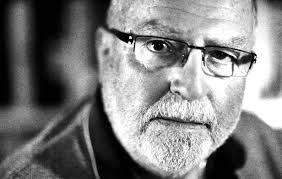#28 Rafe Mair’s fox-like rambles
First published Oct. 19, 2016
REVIEW: I Remember Horsebuns
(North Saanich: Promontory Press, 2015) $14.95 978-1-987857-25-2
by Rafe Mair
Reviewed by Ron Dart
More fox than hedgehog
Isaiah Berlin, in his oft quoted, “The Hedgehog and the Fox: An Essay on Tolstoy’s View of History” (1953), took as his guiding theme a passage from Archilochus: “The fox knows many things, but the hedgehog knows one big thing.” The fox rambles across vast and varied terrain, often in haste and a hurry, whereas the hedgehog burrows ever down and deep.
Rafe Mair’s I Remember Horsebuns is very much the path of a fox, dashing hither, thither, and yon, seeing this, seeing that and reporting on the sights seen. That reference to horsebuns—fragrant horse droppings that once littered city streets—lets us know Mair will be revisiting bygone Vancouver from the 1930s-1950s.
Animated, theatrical, and liberty-loving, I Remember Horsebuns gives us journalist and broadcaster Rafe Mair at his best as he swashbuckles through his younger years while also shuttling forward to some of the main political, economic, and ecological issues that beset us today and likely into the future. Fast-paced, short chapters guide the reader into Mair’s layered life journey and pre-occupations, many often quite unknown until this autobiographical missive left the publishing tarmac.

There is, of course, Rafe Mair, the lawyer, Social Credit MLA and radio host for many a controversial year, owner of the bombastic pose, public persona, and posture. There is also Rafe Mair, the private person. In I Remember Horsebuns many a curtain is pulled back and many delightful and tender moments are revealed.
The Introduction can be off-putting for Canadians with more of a nationalist bent as Mair makes it abundantly clear that he favours and tips his hat more to the American dream and ideals, while recognizing their brutality, than to what he sees as rather boring Canadian history. Perhaps he could use some better coaching in the life, times, and complex personality of Canada.
And despite his tendency to view Western Canada as a victim of central Canadian oppression, much of the book simply revels in the Mair persona: the public figure of glorious rants and idiosyncratic ideological excursions.
There can be no doubt that Mair’s faithful and much needed ecological vision (he gives a supportive nod to Paul Watson) has much to commend it, as do his sensitive insights on Indigenous peoples, the salmon industry (which he sees as dominated by short sightedness), the energy industry, hydroelectric dams, and his compassionate support of animal rights.
These varied positions make Mair a most compelling political commentator who, in his career as in his retirement, transcends the tribalism of the right and left – though he did once serve in the Social Credit Party as a fifth column of sorts. Grace McCarthy’s Foreword is well worth the read, if for no other reason than to turn the ear to two comrades who were once in the thick of the political fray and still have many a tale yet to tell.
Mair provides vivid memories of carefree explorations, school life, fishing and boating expeditions, sports, films, music legends, and neighbourhoods that are no more — as well as some startling reminders of an era when casual racism and a post-colonial Anglo-centric establishment culture tended to dominate.

And Mair is in fine literary fettle, dashing from chapter to chapter, as he covers life in Vancouver and on the West Coast in the middle to late years of the last century, his days as an MLA and cabinet minister, and his meditations on the poignant political issues we face.
But I Remember Horsebuns is an autobiographical excursion in the style of a fox. If readers expect deft and rapier-like insights, they will be rewarded and delighted. If hedgehog burrowing is hoped for, disappointment will reign.
Regardless, I Remember Horsebuns, Rafe Mair’s tenth book, is worth reading both as a pleasurable diversion and for its spotlights on an earlier British Columbia.
When reading the last few chapters, I was reminded of one of Stephen Leacock’s final essays, “Three Score and Ten.” The autumn years are upon the author, and his task is knowing how to live through such a weakening season of the journey. Behind him is his full past, when much has been seen and done, and before him is the future, when uncertainty is the reality and most of the leaves have fallen from the tree.
What remains when all the strong and pliant leaves of holding court and dominating the front stage have fallen from the branches, and the reality of human mortality presses ever closer? There are, in the final few chapters, some tender and suggestive thoughts to ponder by way of bringing the book to a close.
*

Ron Dart of Abbotsford has taught in the department of political science/philosophy/religious studies at University of the Fraser Valley since 1990, undertaken Ph.D studies at McMaster University and served on staff with Amnesty International in the 1980s in B.C. He is a leading authority on the subject of Canadian High–Red Toryism, and some of its most significant thinkers, including Stephen Leacock and George Grant. His 25th book The North American High Tory Tradition (American Anglican Press, 2016) has a foreword from Jonathan M. Paquette of the University of St Andrews Institute of Intellectual History. It was celebrated with a public event sponsored by American Anglican Press and the George Grant Society.
One comment on “#28 Rafe Mair’s fox-like rambles”
Comments are closed.